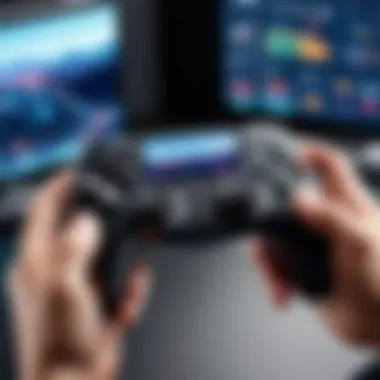Exploring Games with Controller Support: A Comprehensive Guide


Intro
In the evolving landscape of video games, the incorporation of controller support has significantly changed the way individuals engage with their favorite titles. Many gamers find that using a controller enhances their experience, providing a more immersive and tactile interaction with the game environment. As technology continues to advance, the variety and compatibility of games supporting controllers have expanded, creating more opportunities for players, whether they lean towards console or PC gaming. This guide seeks to unveil the many layers of controller-supported gaming, emphasizing its impact on user experience, performance, and the diverse gameplay options available today.
Overview of the Technology
The foundation of controller support lies in the technological advancements that have shaped how games operate. From the early days, where joystick consoles were merely a tool, to today’s intricate designs that allow for precise control and feedback, the evolution is evident.
Key specifications
The contemporary gaming controller is characterized by several key specifications that improve user experience:
- Wireless Connectivity: Almost all modern controllers utilize Bluetooth technology, providing seamless connections with consoles and PCs. This eliminates the hassle of wires and enhances mobility.
- Responsive Inputs: Advanced sensors within modern controllers ensure quick and accurate responses, allowing for real-time actions in fast-paced games.
- Customization Options: Many controllers now offer remappable buttons and customizable layouts, catering to individual player preferences and improving usability.
Unique selling points
Each controller supports unique features that cater to different gaming audiences. Some important aspects include:
- Ergonomic Design: Controllers like the Xbox Elite Series 2 are designed for comfort during extensive gaming sessions, minimizing fatigue.
- Built-in Gyroscope and Accelerometer: Some controllers, such as the Nintendo Switch Pro Controller, come equipped with motion sensing capabilities, further immersing the player in gameplay.
- Advanced Haptic Feedback: PlayStation’s DualSense controller introduced adaptive triggers and haptic feedback that simulate various actions, providing a more nuanced interaction with games.
"The design of a controller can make or break the gaming experience, as it serves as the primary interface between the player and the game."
Design and Build Quality
The design and build quality of controllers play a pivotal role in their effectiveness and popularity among users.
Material used
Controllers are typically made from a combination of durable plastic and rubberized materials, offering both longevity and grip. High-quality materials prevent wear and tear over time, ensuring that controllers remain functional even with intense use. Some advanced models use premium materials for enhanced tactile feedback.
Ergonomics and usability
The ergonomics of a controller dictate how comfortable it feels during use. A well-designed controller accommodates the natural shape of the hands, offering buttons and sticks that are easy to reach. This aspect affects gameplay efficiency and can be crucial for competitive players who require swift reactions and precision.
Prelude to Controller Support in Gaming
Controller support in gaming has become a critical element in the evolution of how games are played and enjoyed. With the rise of various gaming platforms, the integration of controllers has allowed for a more immersive and accessible experience. Whether playing on consoles, PCs, or mobile devices, the use of controllers provides various benefits that enhance user engagement and overall gameplay.
Defining Controller Support
Controller support refers to the ability of video games to recognize and function with external game controllers. This is particularly relevant for games that require precise input and quick reflexes. Controllers come in various forms, including traditional gamepads, joysticks, and even newer innovations such as motion controllers. The integration of these devices allows players to interact with games in a more natural way than traditional keyboard and mouse setups. Consequently, controller support has become a standard feature in most contemporary games.
Some key aspects of controller support include:
- Device Integration: Controllers must seamlessly connect with different gaming platforms. This often requires the use of software or drivers that can facilitate the connection, especially for PC gaming.
- User Interface Adaptation: Games must adapt their user interface to accommodate controller input. This includes remapping buttons and adjusting menus to be navigable via a controller, ensuring a smooth gameplay experience.
- Feedback Mechanisms: Many modern controllers provide haptic feedback, helping to convey in-game events through physical sensations. This feature enhances immersion and can improve gameplay performance.
Historical Context
The concept of controller support has evolved significantly since the inception of video games. Initially, gaming relied heavily on simple joysticks and buttons. These devices were often limited in functionality and offered minimal feedback. As technology advanced, so did the design and capability of game controllers. The introduction of consoles like the Nintendo Entertainment System in the 1980s marked a turning point, with controllers featuring more buttons and analog sticks.
By the 1990s and early 2000s, the rise of 3D gaming demanded more precise input methods. Controllers became more complex, with innovations such as dual analog sticks and trigger buttons. This trend continued, leading to the widespread adoption of wireless controllers, which have become the norm today.
In recent years, the push for cross-platform compatibility has reshaped the landscape. Gamers can now use the same controllers across different systems, allowing for greater flexibility and choice. The importance of controller support cannot be understated; it not only broadens access to gaming but also enhances the depth of gameplay experiences.


By understanding the evolution of controller support, gamers can appreciate how far the technology has come and how it continues to shape the future of interactive entertainment.
Types of Games with Controller Support
Understanding the types of games that utilize controller support is essential for both developers and gamers. This section explores how various genres leverage controllers to enhance the gaming experience. With a myriad of options available, players need to know which games will provide the best functionality when paired with wireless or wired devices. Controller support can significantly impact gameplay, accessibility, and user satisfaction.
Action and Adventure Games
Action and adventure games have long been a favorite for controller use. Titles within this genre often require quick reflexes and precise movements that controllers can deliver efficiently. Players engage in an immersive experience, navigating through vast worlds and facing off against various challenges.
Many popular games, like The Legend of Zelda: Breath of the Wild and Assassin's Creed Valhalla, utilize controller support to enhance player interaction with the environment. The tactile feedback from controllers allows gamers to execute complex maneuvers easily. Furthermore, the button mapping on controllers often aligns well with the gameplay mechanics, offering intuitive controls.
RPGs and Strategy Games
Role-playing games (RPGs) and strategy games also benefit from controller support, though the impact can be subtle. In RPGs like The Witcher 3: Wild Hunt, the use of a controller can streamline inventory management and combat systems. Many players find it easier to wield spells or engage in turn-based battles using a controller rather than keyboard and mouse setups.
For strategy games, while mouse precision is often preferred, some titles like Divinity: Original Sin 2 offer robust controller support. This enables players to move units and make decisions more fluidly from a distance, enhancing the overall gaming experience.
Sports and Racing Games
Sports and racing games are perhaps the most quintessential genres designed for controller use. Controllers provide unparalleled control over vehicle handling and player movements. Games like FIFA 22 and Forza Horizon 5 are optimized for controllers, allowing players to dive into realistic simulations.
Racing games, in particular, highlight the importance of controller feedback mechanisms. The precision and response time of input make a significant difference when navigating sharp turns or managing boosts. Moreover, the ergonomic designs of controllers generally enhance comfort during long gaming sessions.
Technological Advancements in Controller Support
In recent years, technological advancements in controller support have dramatically reshaped the gaming landscape. This section delves into various innovations, focusing on wireless technology integration, enhanced feedback mechanisms, and cross-platform compatibility. Understanding these elements is vital, as they have not only improved user experience but have also expanded the potential for more immersive gameplay.
Wireless Technology Integration
Wireless technology has revolutionized how players interact with games. Previously tethered by cables, gamers now enjoy the freedom of movement that wireless controllers provide. This change is significant for several reasons.
- Increased Convenience: Gamers can move freely in their space, which is particularly advantageous in larger gaming setups.
- Clutter Reduction: Without wires, gaming areas can remain clean and organized.
- Compatibility: Many newer wireless controllers can connect to multiple platforms, allowing seamless switching between devices.
The emergence of Bluetooth technology has also made pairing devices simpler than ever, enhancing the overall user experience.
Enhanced Feedback Mechanisms
Modern controllers now come equipped with enhanced feedback mechanisms that elevate gameplay. Features such as adaptive triggers and haptic feedback create a deeper connection between the player and the game environment.
- Adaptive Triggers: These triggers adjust resistance based on gameplay elements, offering players a tactile way to feel the in-game actions. For instance, resisting the pull of a bowstring offers a physical simulation of the action.
- Haptic Feedback: This technology provides vibrations that mimic real-world sensations, such as the rumble of a car engine or the impact of hits in a fighting game.
Both features enhance immersion and stimulate player engagement. Players often report that these technologies make them feel more present in the game world.
Cross-Platform Compatibility
Cross-platform compatibility is a significant development in controller technology. Many controllers now support multiple gaming platforms, including PC, PlayStation, and Xbox. This compatibility is crucial for several reasons:
- Player Flexibility: Users can switch between different gaming systems without needing to buy multiple controllers. This saves both money and space.
- Community Interaction: Cross-platform play allows friends on different consoles to game together, fostering a sense of community.
- Future-Proofing: As new gaming platforms emerge, controllers that support multiple systems ensure longevity in their usability.
Overall, advancements in controller technology are shaping the future of gaming. The integration of wireless features, enhanced feedback, and cross-platform capabilities promise to create richer, more immersive experiences for players worldwide.
Compatibility Considerations for Controller Support


In the landscape of gaming, compatibility plays an essential role in how players interact with their favorite titles. Understanding controller support is not just about the buttons and sticks; it’s also about recognizing how these devices fit within the broader ecosystem of gaming platforms and games. Proper compatibility ensures seamless integration, reducing frustrations and enhancing the overall user experience.
Supported Platforms
When discussing controller support, one must consider the various platforms available. Different ecosystems provide distinct experiences, and each has its own compatibility requirements. The main platforms include:
- PC: Personal computers often have extensive controller support. Major controllers like those from Microsoft and Sony can connect easily. Furthermore, some games allow for customization of controls, empowering players to tailor their setups.
- Consoles: Systems such as the PlayStation, Xbox, and Nintendo Switch have their own proprietary controllers. Games designed for these consoles typically ensure optimal compatibility, often utilizing every feature of the controller, from touchpads to motion controls.
- Mobile Devices: As mobile gaming grows, so too does the use of controllers. Many modern games now support Bluetooth controllers on smartphones and tablets. This can enhance gameplay, providing tactile feedback that on-screen controls sometimes lack.
- Cloud Gaming Services: Services like Google Stadia or Xbox Cloud Gaming are emerging. These services require robust controller compatibility, allowing gamers to maintain their preferences regardless of the device they use to stream games.
The variety of supported platforms emphasizes the importance of understanding what controller works best for specific systems. Each platform may present unique challenges and considerations that can affect performance and enjoyment.
Game-Specific Requirements
Beyond the broader platform support, game-specific requirements also dictate how well controllers function. Each title may have its own demands based on gameplay style and mechanics. Below are some elements to consider:
- Game Type: Some genres, like first-person shooters or fighting games, benefit greatly from the precision that a controller provides. Such games often have dedicated control schemes that enhance responsiveness.
- Controller Configuration: Not all games come with preset configurations. Players may need to adjust their controller settings based on their preferences or required functionality. Games that allow this customization often see an increase in player satisfaction.
- Performance Requirements: Some games may require specific controller types to utilize advanced features like vibration feedback or motion sensing. For instance, titles designed for the Nintendo Switch may utilize Joy-Con functionalities differently than traditional controllers.
- Updates and Patches: As games evolve, developers may release updates that alter controller compatibility. Awareness of such changes can prevent frustration during gameplay. Keeping controllers updated or compatible with the latest game patches is advisable.
Ultimately, understanding compatibility considerations provides significant benefits. It not only enhances gameplay experience but also leads to better equipment choices tailored to individual gaming styles.
Impact of Controller Support on Gameplay
The inclusion of controller support in video games is not merely a convenience; it significantly impacts how players engage with their games. This influence extends beyond mere control, affecting how gameplay mechanics are perceived and enjoyed. Understanding this impact can provide valuable insights for both players and developers.
User Experience Enhancement
Controller support fundamentally improves the user experience in gaming. When a player uses a controller, they benefit from tactile feedback and ergonomic design. Controllers, like the PlayStation DualSense or Xbox Series X controller, are specifically designed for extended periods of play. This reduces fatigue and discomfort, allowing players to immerse themselves in their gaming without frequent breaks.
Moreover, the layout of buttons on controllers often facilitates a more intuitive interaction with complex game mechanics. Players can react faster to in-game events, enhancing the gameplay flow. For instance, in action games, the placement of triggers, joysticks, and face buttons allows for quick combinations and swift movements, leading to a more immersive experience. Without controller support, the gaming experience may feel less responsive and engaging.
"The right controller enhances the player's connection to the game, fostering immersion and engagement."
Skill Development and Performance
Controller support also influences skill development and overall performance in games. Different genres may require varying levels of precision and coordination, making adequate controller integration essential. In competitive environments, players who master the subtleties of controller inputs often gain a notable advantage over those who rely solely on traditional keyboard and mouse setups.
The tactile feel of controllers can aid in developing muscle memory, which is critical for achieving high performance in fast-paced games. This muscle memory translates into better timing and coordination. When games are designed to take full advantage of controller capabilities, players can explore their full potential, refining their skills comprehensively.
Furthermore, many games now include adaptive difficulty settings that blend seamlessly with controller use. Such innovations mean that input precision can directly affect performance metrics, prompting players to invest time improving their controller skills. The intricate feedback provided by advanced controllers informs player decisions, allowing for a unique gameplay experience that is directly tied to their skill at using these devices.
Both user experience enhancement and skill development emphasize the importance of controller support, which continues to shape how games are designed and played in the modern world.
Evaluating Controller Quality
Evaluating controller quality is crucial when considering the overall gaming experience. The right controller can significantly influence how a player interacts with a game, impacting responsiveness, comfort, and performance. Quality controllers provide better feedback, enhance durability, and may even aid in developing skills over time. It is essential to assess several critical aspects of controller quality to choose one that fulfills your gaming needs effectively.
Build Quality and Durability
Build quality refers to the material and construction standards of a controller. A controller made with durable materials will likely withstand the wear and tear of extensive gaming sessions. Look for controllers that use materials such as high-grade plastics or metals that can resist scratches and damage.
Durability is important not just for longevity but also for performance. Controllers that are more sensitive to temperature or pressure changes may lead to degraded performance over time. For instance, some manufacturers optimize their designs to ensure long-lasting joystick responsiveness and button accuracy. When evaluating a controller, consider checking reviews and user feedback on how it holds up during extensive usage.
Ergonomics and Comfort
Ergonomics is another key factor in controller quality. A well-designed controller should fit comfortably in your hands, allowing for extended play without causing strain. Shapes, button placements, and grip textures all play a role in how comfortable a controller feels during use. Controllers that do not fit well may lead to discomfort or cramping, which can distract from the gameplay experience.


Test the controller, if possible, to ensure a comfortable grip. Some controllers come in varying sizes or have adjustable features to cater to different hand sizes and preferences. Good ergonomics not only enhance comfort but can also improve overall gaming performance, as your hands will be less fatigued and more responsive during critical moments in gameplay.
Choosing the Right Controller for Your Game
Selecting an appropriate controller is essential for any gamer seeking an optimal experience. A controller can significantly impact gameplay sensitivity, ease of access to controls, and overall comfort during extended sessions. The right choice can enhance performance in competitive settings or create a more enjoyable experience in casual play. With a diverse market of options, understanding key considerations is crucial.
Budget Considerations
When contemplating a controller purchase, financial implications often play a crucial role. Different controllers come at various price points, and assessing your budget is imperative. Here are some key factors to consider:
- Entry-Level Controllers: Affordable options like the Logitech F310 offer basic functionality without breaking the bank. They present a suitable choice for occasional gamers.
- Mid-Tier Controllers: Controllers such as the Xbox Wireless Controller deliver improved build quality and additional features, striking a balance between quality and price.
- High-End Options: Premium controllers, like the SCUF Infinity4 PS4, provide maximum customization and advanced features. However, their prices can be significantly higher.
Ultimately, balancing features with your budget helps in identifying suitable controllers. Overspending on advanced features that may not be utilized is common. Hence, understanding your needs will guide you toward a sensible financial decision.
Personal Preferences and Gaming Style
Personal preferences play a crucial role in the selection process. Each gamer has unique tastes, which can influence how well they connect with their gaming setup. Different styles of play require different controllers:
- Casual Gamers: If you play sporadically, a basic controller with standard features should suffice. Simplicity and ease of use become essential.
- Competitive Players: Gamers looking to enhance their performance may require controllers with advanced functionalities. Features such as customizable buttons or adjustable sensitivity can make a difference in the heat of competition.
- Gaming Genres: Specific genres often demand different controller types. For instance, racing games typically benefit from controllers designed for precision steering, while first-person shooters may require controllers that allow swift reaction times.
Future Trends in Controller Support
The gaming landscape continues to evolve, and controller support is no exception. Understanding the future trends in controller support is vital for both manufacturers and gamers. These trends do not just dictate how devices will be used, but they also enhance the overall gaming experience. Major advancements are underway that could redefine gaming interaction.
Predictive Analytics and AI in Controller Design
Predictive analytics, coupled with artificial intelligence, is set to revolutionize controller design. Controllers are becoming more than just input devices; they are evolving into smart tools that learn from player behavior. By analyzing gameplay patterns, AI can adapt settings and suggest enhancements, tailoring the experience to individual preferences.
Here are a few potential benefits:
- Personalization: Controllers can adjust sensitivity and layout automatically based on the player's preferred style.
- Enhanced Engagement: By understanding player habits, these controllers can provide customized challenges and feedback, keeping the player engaged longer.
- Predictive Feedback: AI technology can anticipate player reactions, allowing the game to respond in real-time, enhancing immersion.
This shift paves the way for a more intuitive gaming experience, encouraging developers to consider user behavior when designing games.
Virtual Reality and Immersive Gaming Experiences
As virtual reality continues to grow, controller support must adapt to the immersive demands of VR environments. Controlling a game in VR requires more than just standard buttons; it necessitates a level of interaction and feedback that traditional controllers cannot always provide.
Future controller designs will integrate more haptic feedback and motion detection capabilities. Features may include:
- Gesture Recognition: Controllers may utilize cameras or sensors to interpret physical movements, allowing players to control gameplay through gestures.
- Spatial Awareness: Increased accuracy in tracking will enable players to interact with the virtual environment more naturally, making the experience feel more real.
- Immersive Feedback: Advanced haptic technology will enhance the sensation of touch, allowing players to feel different textures in-game or the impact of virtual actions.
In essence, as gaming becomes more immersive, the way players interact with their controllers will also evolve, further blurring the lines between the virtual and real worlds.
The future of controller support is not just about more buttons or better connectivity; it's about creating engaging, personalized experiences that respond to individual player needs.
Epilogue
The conclusion of this article synthesizes the main themes and insights regarding controller support in gaming. It highlights the significance of such support, emphasizing how it enhances the overall gaming experience. By allowing players to interact with games more intuitively and comfortably, controller support is not just a technical feature; it serves to deepen engagement through enhanced user experience and performance.
Summarizing Key Takeaways
To underscore the most critical aspects presented in this guide, consider these key takeaways:
- Diversity of Games: Many genres, from action to strategy, benefit from controller use, making it essential for gamers of all preferences to find suitable titles.
- Technological Innovation: Advancements in wireless technology and cross-platform compatibility continue to enhance how gamers interact with their favorite titles.
- User Experience: Improved ergonomics and feedback mechanisms lead to increased comfort, enabling players to immerse themselves in gameplay without physical strain.
- Future Trends: Controllers are evolving with predictive analytics and AI, suggesting a bright future for customizable gaming experiences.
Encouraging Informed Choices
As gamers navigate the diverse landscape of controller-supported options, informed decision-making becomes paramount. Understanding various controllers’ features—such as build quality, comfort, and suitability for specific games—allows players to choose wisely. Furthermore, being aware of budget considerations is crucial, as high-quality controllers can span various price ranges.
The growing complexity of games and gaming technology encourages players to educate themselves on how best to enhance their gameplay. Leveraging online resources and community discussions on platforms like Reddit or forums can provide insights into personal preferences. This collective knowledge enhances their ability to select the most fitting controller, ensuring that each gaming session is as enjoyable as possible, tailored to their unique style.







